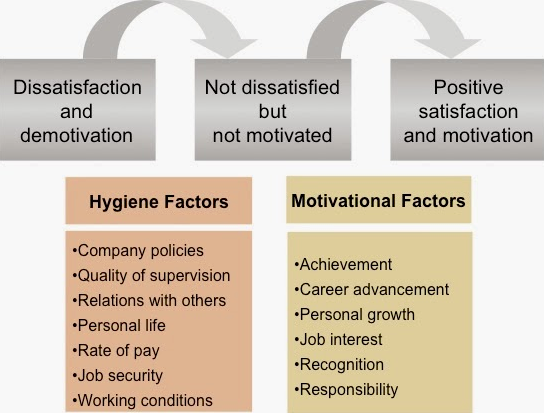
One of the best ways to motivate employees is to provide a pleasant work environment. Keeping this in mind, we at Calibre Office Furniture have taken a great interest in discovering more about all the factors like smart office design that help towards boosting employee morale.
To examine this concept further we found it useful to learn more about the famous motivational two-way theory founded by Frederick Irving Herzberg. We wanted to find out what exactly it is that creates a positive office environment so we could provide some useful learnings for our readers.
When carrying out our research, it was found that in the 1950’s Professor Herzberg started studying companies to collect data on job satisfaction and motivation in the workplace, leading to his famous Two Factor Theory. See below:

In this post, we examine the fourteen factors of Herzberg’s theory to see how you, too, can create a positive work environment. We will also assess how an optimal office design using the correct office furniture plays an important role in employee motivation and productivity.
Hygiene Factors
Factor 1: Company Policy and Administration

The purpose of company policies is for employees to understand and live by the fundamental rules of the office. These policies outline the company’s expectations when it comes to things like the dress code, performance, training, and general behaviour at the workplace.
For example, at Calibre, one of our key goals is to provide clients with a personal, comprehensive and tailored service. All employees are made aware of these objectives and policies and are requested to practice them throughout their employment with us. We also provide adequate training sessions to enable our employees to be a step closer to achieving our company goals and objectives.
Herzberg recommended that employers remove some job controls, which would give employees more autonomy, and make them take ownership of their jobs and the goods and services they produce. Policies should not be too rigid, but should, instead be clear and fair. In order to improve job satisfaction, the onus is on companies to fix poor and obstructive company policies.
Of course, we’d like to add our recommendation to that: if companies are improving the circumstances under which their employees work, they should do it the right way with a pleasant work environment, which includes adequate breakout areas with comfortable office furniture!
According to our CEO, Dave Robbins:
Most people will spend a significant part of their day sitting on their office chair; the chair therefore has the greatest impact on posture, comfort and productivity. A well designed ergonomic chair or piece of office furniture will allow people of different sizes to achieve good comfort and support and can also encourage healthy movement.
A spacious, comfortable & well-appointed office is a motivating factor, and even if you tweak your company policies only a little bit, your staff will still be delighted with their work environment.
Factor 2: Supervision

An organisational structure that values both the people it offers services to and its employees will reap the benefits of developing, operating, and supporting good supervision. According to the Social Care Institute for Excellence, research indicates that good one-on-one supervision has the following features:
- It happens frequently in a safe environment
- It is based on a cooperative & mutually understanding relationship
- In addition to being embedded in the company’s culture, the process must be understood and valued by all staff members in the organisational hierarchy structure.[1]
In order to understand the concept of supervision better, Infed[2] advises businesses to take a look at the different types of apprenticeship that were popular in various societies over the centuries. For example, in ancient Africa, China, and Europe there are many cases of individuals learning a new craft or work activity in the traditional manual labour type of jobs with the assistance of experienced senior staff members.
As a result, the novice is able to gain advanced skills, knowledge and commitment through this practice of physically “learning through doing” with the help of their designated mentors. Nowadays the same way of working is also commonly used in office-based jobs.
In addition, there are also new forms of modern supervision as well, such as peer group supervision, which is an effective form of leaderless peer group counselling. Group participants consult with one another by sharing key issues of their professional daily lives, in order to offer solutions for challenging situations with co-workers or customers.
Regardless of the type of supervision that is present in your organisation, Herzberg has put great emphasis on the fact that it is an essential “hygiene factor.” Accordingly, employees will experience dissatisfaction if it is absent or substandard. Good supervision can be shown even in minor ways, such as ensuring employees have adequate office storage solutions, or that they have the tools to complete the job at hand.
Corporate companies must follow Calibre’s example in ensuring that supervision is present for junior staff members and that supervisors are adequately trained to execute their leadership role.
Factor 3: Interpersonal Relations
The term “interpersonal relations” refers to the bond between two or more people. According to the Management Study Guide, interpersonal relationships can take place between any of the following:
- People working for the same organisation
- People working on a team together
- Relationship between friends
- Relationship between a husband and wife
- Relationship of children and parents
- Relations between family members
People who work on developing strong interpersonal skills are generally more successful in both their personal and professional lives. Since most companies want people who will work well in a team and be able to communicate well with clients and colleagues, they often seek to employ staff with “strong interpersonal skills.”
The skills that these employers are looking for include good verbal and nonverbal communication, problem solving and negotiation skills, listening skills, decision-making, and assertiveness. Without good interpersonal skills it is often harder to develop other important life skills. Interpersonal or “soft” skills, unlike technical or “hard” skills, are used every day and in every area of our lives.
Although good interpersonal relations alone will not improve worker productivity, it can contribute significantly towards it. A supervisor who takes the time to listen to an employee will show that employee that he or she is valued, and it may even empower employees to solve challenges on their own.
Given the value of good interpersonal relations, clearly it’s important for companies to encourage employees and their supervisors to connect with each other. This can be as simple as providing a staff lounge area with comfortable breakout furniture to enable employees to socialise with each other and maintain a healthy work/life balance.
Factor 4: Salary

Herzberg’s research shows that the link between compensation, motivation, and performance is much more complex than more pay equalling more work. A recent study by Yoon Jik Cho and James Perry confirms this: they found that employees are more likely to like their jobs if they focus on the work itself, and less likely to enjoy it if they are focused on money.[3]
On the other hand, writer Linda Ray asserts that incentive pay, based on the amount of work provided rather than the total time spent on the job, tends to increase worker productivity. Salary increases based on performance boosts productivity, says Ray, while raises based purely on time spent with the company can be a disincentive for employees to improve.[4]
Another blogger, Kazim Ladimeji, points out that open source enterprises such as Mozilla, WordPress, and Ubuntu were all able to create world-class products and services using pools of enthusiastic volunteers. Pay is evidently not the only way to motivate people, nor is it necessarily the strongest way. When it comes to motivation, research suggests that intrinsic rewards such as a sense of meaningfulness, a sense of competence, a sense of choice in how we work, and a sense of progress are what really get people going.[5]
This made it clear, then, that companies need to plan pay raises carefully, and that they should also look at extrinsic factors if they want to improve employee motivation. An employee with chronic back pain will appreciate comfortable office furniture that meets their needs. This in theory, is more likely to motivate them to produce better quality work than just receiving a higher pay packet.
This way of thinking in a workplace can prove to employees that their individual needs and wellness are valued and taken seriously by the management team, which is always a plus point for any organisation. This is certainly the case at Calibre Office Furniture. We always ensure that our employees use office furniture they feel most comfortable with. For us, employee wellness is of key importance and immensely essential to get right for each and every one of our staff members.
Factor 5: Status
.PNG)
Herzberg determined that real job satisfaction rests in a rewarding job experience, more commonly known as vertical job loading or job enrichment. The most industrious, happiest employees work for companies that expand their staff’s expertise through benefits or programs promoting recognition, achievement, advancement, and responsibility.
Job enrichment adds status to one’s work, and is naturally a strong motivating factor. Employees tend to find more meaning in jobs with higher status, and also greater variety and a higher sense of achievement. These benefits are direct results of the greater significance of higher status jobs.
Both employees and employers benefit from job enrichment, in terms of motivation, satisfaction, performance, job involvement, and reduced absenteeism. Part of the reason employees are eager to improve their job status is because they want to participate in the company’s decision making. In fact, if used correctly, employees’ enthusiasm for improved job status can guarantee the success of an organisation. Young people in particular consider job status as perhaps the most important motivational factor because they are full of youthful energy, and they are also ambitious.
According to Herzberg, achievement, recognition, advancement, the possibility of personal growth, and responsibility are not highly dissatisfying when absent, but when present they result in good job performance since they build strong levels of motivation. Herzberg contends that one of the ways in which managers can eliminate job dissatisfaction is to build status by providing meaningful work for all job positions.
Still, employees who seek status for its own sake, and not out of passion for their jobs, can be problematic. These employees may focus on getting ahead by any means necessary, often to the detriment of office harmony. Forbes Magazine recommends that employers headhunt only job seekers who always escalate their goals through intrinsic motivation. [6]
Factor 6: Job Security

Holding only one job – or a few jobs – in a lifetime used to be the norm. Never having a reason to dread downsizing, the previous generation did not feel the need to search for something better, and often spent 20 or 30 years with the same company. The world is very different these days. People entering the workforce within the past few years may occupy office desks in ten or more different companies before they retire.
Writer Sarah O’Connor makes it clear that this high turnover rate is not due to an inherent restlessness in the millennial generation, but rather due to job insecurity.[7] When millennials are at the conference table negotiating job packages, they often find it difficult to find the type of permanent contracts that would enable them to secure loans and make a down payment on a house.
Job security is a worker's conviction or guarantee that they will keep their current job. There are some outside factors that have an effect on our job security. For example, job security would depend on how well the business that we are working for is faring, and whether the country is in an economic recession or expansion.
Other factors, such as supply and demand, affect job security. At Calibre, we have built strong working relationships with the top manufacturers in the industry. This guarantees supply. With our commitment to quality, and the level of service we provide, demand for our products is likely to remain strong as well. We pay attention to supply and demand, and this helps our business to remain competitive, thus enhancing job security for our colleagues across the company.
Herzberg listed job security as a “hygiene factor,” i.e., if it’s not present, employees would be de-motivated, but it would not by itself motivate staff to work harder. This is in contrast to “motivators,” such as a nice glass desk in a corner office, or intangibles such as recognition or promotion. Herzberg believed that businesses should improve the nature and content of jobs, and also that they should motivate employees by adopting a democratic approach to management.
At Calibre we know that living with job insecurity, which translates to being in constant fear of losing one’s job, is very stressful. Since it’s also a de-motivator, we address this fear, as it could ultimately affect the bottom line of a business. How do we address it? By proactively communicating with our employees. If there’s bad news, we discuss the implications, so they’re prepared for the possible impact. We celebrate good news together as a team. In this way, we create trust, effectively replacing the fear that comes with job insecurity.
Factor 7: Personal Life
Is your organization the type of place where employees freely share personal information? Or are your workers treated as pieces of furniture, as if they were little more than office chairs or desks? Most employers fall somewhere in between.
There are many reasons for keeping personal details out of the workplace. For example, a worker being considered for a promotion would profit from having an aura of good judgment, strength, and social skills. If a female employee for example feels the need to open up about her difficult boyfriend, she should first think about the effect it would have on her superiors, and in what light they would now view her.
Keeping your personal life private can help you cultivate a good professional image while still maintaining sound working relationships with your co-workers. The first thing to do is to decide precisely where you want to draw the line. Employees also need to know that there are certain questions an employer cannot ask, and that their rights concerning this are protected by law.
Apart from religion and political views, which are well-known dividers that should not be discussed at work, what other details of your private life should be left private? Details such as your sex life, how much money you’re making, or how you got plastered at the pub last night. You should also keep quiet about your personal medical issues.
It’s not advisable to engage with or about your colleagues on social media, as this lead to unnecessary gossip, which may spiral out of control at work. Lastly, be careful about the type of jokes you tell at work, especially if they’re not politically correct.
Herzberg listed personal life as a hygiene factor – employees would be de-motivated if they could not bring certain aspects of their private lives on the job. For example, employees will need time off for medical appointments, or to attend to some of their children’s needs. However, it’s important for employees to know where to draw the line, especially if they want to advance their career in the organisation.
Factor 8: Working Conditions
Security, health and safety, and working hours are all factors affecting employees’ working conditions. Employers are legally responsible for providing good working conditions, but workers have a duty to work safely. In 1993 the Workplace Health, Safety and Welfare Regulations became law. These regulations lay down minimum standards for workplaces and work in or near buildings.
In September 2016 The Independent reported that online fashion retailer ASOS was being investigated because of its poor working conditions. At the warehouse, reports The Independent, employees were made to remove their shoes for spot checks. Employees were also checked when entering the bathrooms.[8]
On the flip side, in the Netherlands, each company must assign at least one of its employees to hold the position of prevention officer. The prevention officer looks after everyday health and safety matters at the workplace. Employees must be given an opportunity to have a periodic occupational health examination. Each company must have an emergency response system.
Working conditions is the last of Herzberg’s hygiene factors – employees would be de-motivated if their company does not have a health and safety policy, particularly in dangerous industries such as construction. However, having such a policy in place is not enough to inspire employees to work harder.
Employers must go the extra mile, starting with basic needs such as ergonomic, comfortable office furniture. Businesses should also keep storage solutions in mind, and plan accordingly with suitable office cupboards so that employees can remain organised. As mentioned earlier in this post, employers can also invest in employee perks such as breakout areas, and encourage team bonding with fun events like sports day.
At Calibre we wanted to ensure good working conditions for our workers, and we knew it was important to espouse certain values, and promote safety, communication, and fairness across the board. We’re not just about producing and selling office furniture online: we care deeply about the wellbeing of our workers. We are proud to say that our employees have excellent working conditions, especially given the large proportion of time spent at work.
A recent study [9] found that the work setting is the most critical element of employee happiness. Even if all you do is upgrade the employee’s desk furniture, you will go a long way towards making him or her a happier worker.
Motivator Factors
Factor 9. Achievement

It’s become relatively common for workers to keep track of their achievements at work. Having a complete collection all your accomplishments will greatly help, no matter where you are in your career. It will help with:
- Requesting a salary increase or a promotion
- Preparing for performance reviews
- Getting support for a new assignment or initiative
- Impressing fellow attendees at networking events
- Effortlessly updating your resume
- Answering interview questions for a future job, if need be.
Employees need to know how to sell themselves by using powerful words to describe their achievements. You should also ensure that you mention any over-achievements, for example targets surpassed by a large margin.
Prospective employers seek leadership qualities in employees at all levels. Employees should take time to list projects, leadership positions, and event coordination if they are members of a professional organisation, association, or union. Even parent/teacher associations, church councils, and volunteerism can set one employee apart from another who is not active in any of these areas.
The evidence that achievement is a motivator is clear-cut. As a result of Herzberg’s work, employee rewards are moving away from the payment-by-results system, and moving towards cafeteria-style schemes, which allow individual workers to select the fringe benefits that best suit them. Many employers offer the opportunity to pursue educational achievements, and if employees opt for this, it should be listed along with all other achievements.
Herzberg also developed the concept that there are two basic human needs: physiological and psychological. Achievement falls under psychological needs, which he defined as the need for personal fulfilment and growth. Achievement leads to satisfaction, which is one of the greatest motivating factors an employee can experience.
Factor 10: Recognition
.PNG)
Any official (or casual), and timely acknowledgement of a group's or an individual’s work, behaviour or business result, which supports the company's principles and objectives, can be termed employee recognition. An effective manager or supervisor must comprehend the psychology of praising others for their good work. He or she must also employ the principles of employee recognition and inspire others to introduce it in their working relationships.
Non-profit businesses are good at recognising the valuable contributions of volunteers. Other business models should follow their lead by creating employee recognition programs such as staff awards or nominating an “Employee of the Month.” Employee recognition programs let employees know that their hard work is valued. According to hrcouncil.ca, this type of program is important because:
- It gives workers a sense of ownership and belonging in their workplace
- It lets employees know that their work is respected
- Boosts loyalty
- Increases morale
- Helps build a supportive work environment
- Improves employee retention
- Increases employee motivation
According to CV Tips, a lack of recognition is a major problem that people have on the job.[10] In many companies, a lack of recognition is part of the organisational culture, and this is poor management practice. The most common reason for lack of recognition, says CV Tips, is lack of understanding of the employee’s role. Some senior managers are often unaware of the hard work of junior members of staff, and so they neglect to praise them for it.
In many companies financial reward and recognition go hand in hand. Contributor to Forbes Magazine Meghan M. Biro thinks that this attitude misses the point of recognition: money is not the only thing that motivates people.[11] An employee recognition meeting in your boardroom might go a lot further than just adding extra money to a good worker’s salary.
So why is a “thank you” more important than a bonus? Because staff members want to know that their work is contributing to business success and helping to shape their own job progression path. Today’s workers want to be recognised for achievements affecting the business and are motivated to push results when their work is celebrated.
Factor 11: Growth Possibilities

Guarding Minds @ Work provides the following definition for employee growth and development: “Growth and development occur in a work environment where employees receive encouragement and support in the development of their interpersonal, emotional, and job skills.[12] It is good practice for the workplace to offer a variety of opportunities for staff to build their proficiencies to help with their existing jobs and plan for likely future positions.
Contributor to Forbes Magazine Victor Lipman describes a comment he received on one of his articles: “employees will always perform at their best when the environment is conducive to growth. [13] The potential for growth makes an enormous difference when it comes to employee motivation. Organisations can offer several different types of growth, including financial growth, career growth, professional growth, and personal growth.
Employees can increase their knowledge and proficiencies when they have good prospects for growth and development, and they can then use the skills they have gained for new opportunities, as and when required. Opportunities for employee growth and development include:
- Tuition reimbursement for continuing education courses
- Training sessions offered in-house or run by external organisations.
- Mentoring, coaching, and leadership development programs
- Opportunities for promotion and internal career development at yearly performance reviews.
Herzberg suggested that jobs be enriched (vertically loaded) as a stimulus for true motivation. Jobs can be enriched by giving employees new and more challenging responsibilities not previously handled, and by assigning exclusive or specialist tasks, enabling them to become experts. Herzberg believed that job enrichment would lead not only to professional, but also to psychological growth.
Factor 12: Career Advancement
.PNG)
Within the career development framework of this motivation model, advancement refers to the upward path of an individual’s career. An example would be a Cashier at a bank who gains the experience and takes the requisite courses to eventually become an experienced and well paid Personal Banker. It’s important for prospective employees to learn about opportunities for advancement during their job search.
All Business suggests that if one wants to pursue career advancement, he or she should request a meeting with the boss and have a direct and meaningful discussion about one’s future in the company.[14] Employees looking for career advancement should also seek more work – ask for more responsibilities or volunteer to help other departments or teams – since this increases one’s value within the organisation.
It’s important that employees know that competence alone will not get them where they want to be in the organisation. These employees must ensure that management knows when they do good work. Employees often assume that their bosses will automatically select them if an opportunity for promotion opens up, but unfortunately, this is not always the case.
It is good practice for companies to follow Herzberg’s model and motivate employees with career advancement opportunities. This is because it’s costly to replace skilful workers, who tend to leave for better career prospects at other companies. High employee turnover can also have a demoralising effect on an organisation, and it can severely impact its general efficiency and business work flow.
Herzberg’s premise is that motivators such as career advancement lead to great job satisfaction, because of employees’ need for growth and a sense of achievement. Increasing employee knowledge and cultivating proficiencies and opportunities will, in the long run, increase the value of an organisation’s human assets. A simple task like improving career advancement prospects for colleagues can lead to greater staff commitment, loyalty and understanding.
Factor 13: Level of Responsibility

Kent Beck said, “responsibility cannot be assigned; it can only be accepted. If someone tries to give you responsibility, only you can decide if you’re responsible or if you aren’t.” As circumstances dictate, each of us can become under-responsible or over-responsible, particularly when responsibilities are not clearly defined.
Accepting extra tasks is a very good way to get promoted. However, employees first have to demonstrate responsibility, which they can do by:
- Being dependable: employees seeking promotion should gain the confidence of co-workers, the supervisor, and customers, who should be able to depend on them every day, particularly during busy and challenging periods.
- Making appropriate choices relating to office wear and their demeanour in general.
- Showing up for work on time and putting in the required work.
When an employee reaches the point where he or she can do a job with ease, many employers then seize the opportunity to assign extra tasks, or, if there is an opening, to offer a promotion. This is a delicate balance, because employees sometimes resent the additional responsibilities, especially if it comes without recognition or extra pay. Employers are finding that offering a combination of the two options works hand in hand.
The term “motivators” describes the employee’s relationship to what he or she does, i.e. his or her daily responsibilities. Herzberg classed level of responsibility as a motivator, and it is therefore associated with long-term positive effects in job performance (unlike hygiene factors such as status and job security, which produce only short-term changes).
Factor 14: The Job Itself

What starts out as just a job usually progresses to a career, and if you really like what you do, it can become your long-term profession. How do we go from one stage to another? If a job is meaningful to you, it will propel you to move between the different stages of the company hierarchy. Meaning is why we work past the obvious motive of receiving a salary. It helps us see past problems and focus on reasons we’re working in the first place.
Researchers studying zookeepers found that they were exceptionally involved in their work. They found that their work had purpose, even though it was unglamorous and often risky. They had found meaning, and so were able to create their own engagement.
Another study, this time commissioned by the Association of Accounting Technicians, found that several factors outweigh the pay cheque, such as self-worth, relationships with co-workers, and the nature of the job itself. Eight in ten of 2,000 respondents said they would refuse a large wage increase if it meant working with people or an environment they didn’t like.[15]
This study shows the importance of work happiness, and of doing a job one enjoys. Other perks, such as a pleasant office environment filled with comfortable modern office chairs and desks, are also important to employee happiness, potentially leading to greater productivity. As an employer, you feel great pleasure when employees can derive intrinsic satisfaction from their jobs, and it is important that you recognise and encourage this.
Conclusion
Herzberg, also known as the “Father of Job Enrichment,” challenged thinking on motivation and work with his Two-Factor Theory. Managers can now fulfil the basic needs of employees by identifying and dealing with hygiene factors, thus removing any element of dissatisfaction. Employers can apply the theory to motivate employees by fulfilling their esteem and self-actualisation needs.
At Calibre Office Furniture, we closely follow Herzberg’s theory, and have found that it promotes harmony and job satisfaction. Being suppliers of office furniture, we are able to incorporate superb pieces into our office décor, and our employees are able to benefit from an environment conducive to work. Their job content is also well thought out, so that employees feel challenged and can enjoy what they do.
Thinking of applying Herzberg’s theories to your business? We have found it to be an outstanding model to follow, and our employees are great advocates of this theory. While we can’t deliver on all of Herzberg’s principles, we can certainly help you in your quest to provide a comfortable working environment, with ergonomic office furniture that allows your employees to improve their productivity and morale levels, which will as a result bring in more business for you.
References
[1] http://www.scie.org.uk/publications/guides/guide50/
[2] http://infed.org/mobi/the-functions-of-supervision/
[3] https://hbr.org/2013/04/does-money-really-affect-motiv
[4] http://smallbusiness.chron.com/salary-affect-workers-productivity-38126.html
[5] https://www.recruiter.com/i/how-much-does-pay-level-affect-motivation/
[6] Forbes Magazine
[7] https://www.ft.com/content/8d22895a-20dc-11e6-aa98-db1e01fabc0c
[8] http://www.independent.co.uk/news/business/news/asos-working-conditions-staff-treatment-report-mp-investigation-a7339891.html
[9] Robert Half International
[10] CV Tips
[11] Forbes Magazine
[12] Guarding Minds @ Work
[13] Forbes Magazine
[14] All Business
[15] AAT